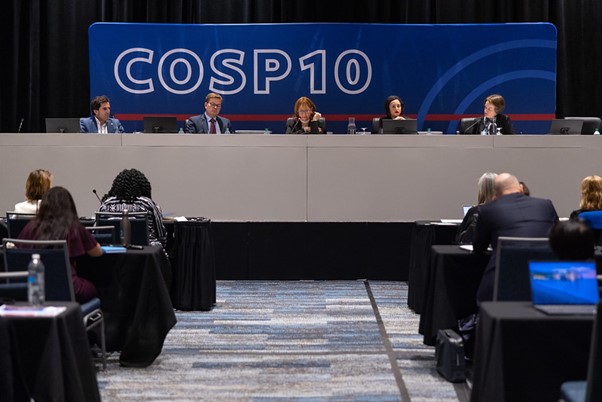
Since the adoption of the United Nations Convention against Corruption (UNCAC) and Principle Ten of the UN Global Compact, more and more States have established legal frameworks supporting corporate compliance and the criminalization of unethical business practices. However, today companies also need to consider the rising expectations from consumers, investors, governments and employees to act with integrity and in the best interest of the planet and society.
As a result, companies are now working beyond traditional corporate governance or mere compliance with legal requirements, towards acting as responsible corporate citizens looking to positively affect the ecosystem in which they operate. To that end, the UN Global Compact created the Transformational Governance approach, which requires companies not only to be accountable, ethical and transparent but to also address the impact they have on societies and the environment - and to take it one step further, by contributing to justice, peace and strong institutions, in line with Sustainable Development Goal (SDG) 16.
Based on the discussions during the Private Sector Forum held at the tenth session of the Conference of the States Parties (CoSP10) to the United Nations Convention against Corruption, UNODC and the UN Global Compact embarked on updating the 2013 publication ‘An Anti-Corruption Ethics and Compliance Programme for Business: A Practical Guide’.
While the standards set forth by the Practical Guide remain relevant, the business environment has shifted, creating new priorities and complexities for companies. Coming to the forefront are matters related to the effectiveness of compliance programmes, corporate sustainability regulations and reporting; gender and diversity; talent recruitment and retention; the evolution of technology and artificial intelligence; stakeholder capitalism and corporate purpose; emerging risks resulting from geopolitical issues and converging crises; increased global supply chain interdependence; to name just a few.
With a Transformational Governance lens, the Guide will gain new relevance, providing critical insights for companies to better respond to new realities, both internally and in their operating environment, towards enhancing business integrity around the world.

In alignment with UNCAC, Principle Ten of the UN Global Compact and other standards, governments need to strengthen policies, legal frameworks, and mechanisms to incentivize business integrity in companies and their supply chain, and to tackle impunity by detecting and sanctioning wrongdoing. The resolution, adopted at CoSP10, commits States parties to develop effective frameworks that can incentivize the private sector to adopt integrity measures.
Governments can mix sanctions and incentives to promote compliance while sanctioning misconduct. To help guide these efforts, UNODC, the UN Global Compact and the Organisation for Economic Co-operation and Development released the publication ‘A Resource Guide on State Measures for Strengthening Business Integrity’ in March 2024.
Companies should also inspire good behaviour in their business partners, suppliers and other third parties through improved due diligence processes and monitoring systems, working with them and with governments to build an environment conducive to investment, economic growth, and sustainable development.
Companies, governments, and civil society can engage in collective action to foster more ethical and transparent business environments by using multisectoral approaches, cutting across themes such as environment and human rights to create synergies that help advance the 2030 Agenda for Sustainable Development.
As outlined in the publication ‘Uniting against Corruption: A Playbook on Anti-Corruption Collective Action’ (UN Global Compact, 2021), stakeholders can apply the collective action methodology to address identified corruption challenges and mitigate potential business risks. This can be done by establishing public-private partnerships to support local businesses, including small and medium-sized enterprises (SMEs), to strengthen integrity and manage corruption risks, as well as by engaging in multi-stakeholder dialogues to generate inclusive and innovative solutions for people and the planet.
Such a collaborative approach is key to building a sustainable and responsible business environment while promoting investment. Collaboration between public sector, private sector and civil society representatives allows for an exchange on current collective action initiatives and brainstorming potential and future ones. It can galvanize the private sector to work with governments and other stakeholders in preventing corruption.
UNODC and UN Global Compact will continue to facilitate collective action to strengthen business integrity. For more information, see the UNODC Business Integrity Portal and UN Global Compact’s Anti-Corruption Collective Action website.

Business integrity education provides companies with opportunities to engage with and support collective action alongside academia and students to foster anti-corruption, therefore shifting the mindsets of future professionals away from corrupt practices and towards ethics, integrity, accountability, and transparency. These are opportunities they should not pass by, as through them companies can enhance their business integrity action beyond compliance measures.
Businesses can involve themselves in university curricula through business practitioners teaching components on compliance topics, coupled with providing on-the-job training programmes and internship opportunities for university students. These measures can help educate future generations of employees motivated by their ethical mindsets to become leaders transforming the culture of integrity within their organizations. In the medium- to long-term, this can help the businesses involved retain talent and create trust in their corporate culture, as well as ensuring continuity of ethical leadership.
Based on the results and experience from the Global Integrity Education project, UNODC gathered these and other recommendations in the ‘Good Practices Guide on Enhancing Business Integrity through Education’ (2024).
In today's complex business landscape, compliance programmes face unprecedented challenges with expanding regulations, resource constraints and data fragmentation. Traditional manual processes are increasingly inadequate for meeting stakeholder demands for ethical business conduct. Through advanced analytics, predictive capabilities and automated processes, artificial intelligence (AI) can help companies move beyond reactive compliance monitoring to proactively identifying opportunities for positive impact. These tools can enable organizations to not just detect risks but to drive systemic change and strengthen organizational frameworks. While AI has emerged as a transformative technology with significant potential to enhance business integrity and compliance programmes, there is currently a critical gap in global guidance on its implementation. Despite being widely recognized as a priority area - including in high-level forums such as the G20 and CoSP10 - no comprehensive guidelines currently exist on how to effectively leverage AI to strengthen integrity and compliance programmes.
In view of the above, this thematic area emerges at the intersection of compliance needs, technological capabilities, and societal expectations. UNODC and the UN Global Compact aim to develop practical tools that help companies harness AI's potential to maximize their compliance programmes as drivers of ethical business conduct.
Private Sector Forum at CoSP10
Anti-Corruption Call to Action on the UN Convention against Corruption 20th Anniversary
A Resource Guide on State Measures for Strengthening Business Integrity (new edition 2024)
Good Practices Guide on Enhancing Business Integrity through Education
Uniting against Corruption: A Playbook on Anti-Corruption Collective Action
Transformational Governance Corporate Toolkit